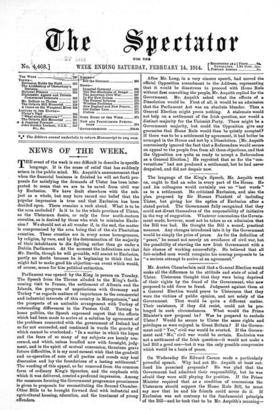After Mr. Long, in a very sincere speech, had moved
the official Opposition amendment to the Address, representing that it would be disastrous to proceed with Home Rule without first consulting the people, Mr. Asquith replied for the Government Mr. Asquith asked what the effects of a Dissolution would be. First of all, it would be an admission that the Parliament Act was an absolute blunder. Then a General Election might prove nothing. A stalemate would not help on. a settlement of the Irish question, nor would a distinct majority for the Unionist Party. There might be a Government majority, but could the Opposition give any guarantee that Home Rule would then be quietly accepted? If there was to be a settlement by agreement, it had better be ananged in the House and not by a Dissolution. [Mr. Asquith conveniently ignored the fact that a Referendum would secure an appeal to the people free from all these objections, and that the Opposition are quite as ready to accept a Referendum as a General Election.] He regretted that so far the "con- versations" had not produced a settlement, but he had never despaired, and did not despair now.






































